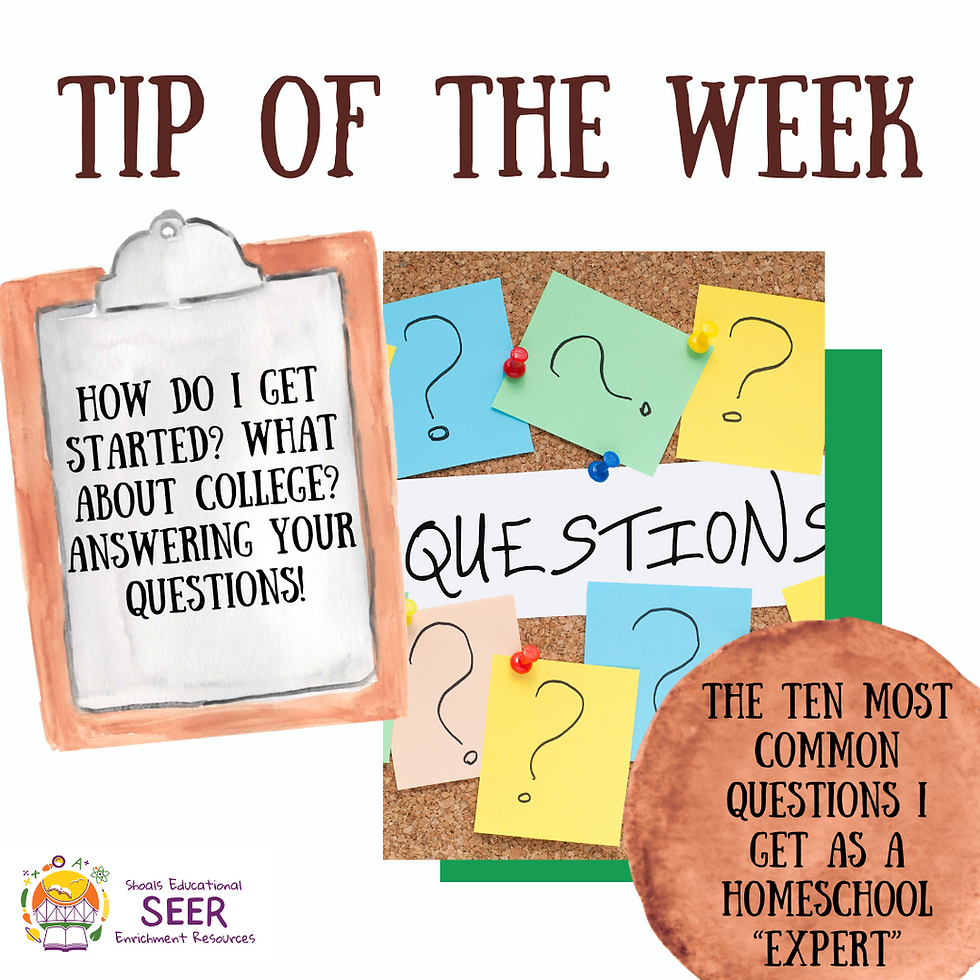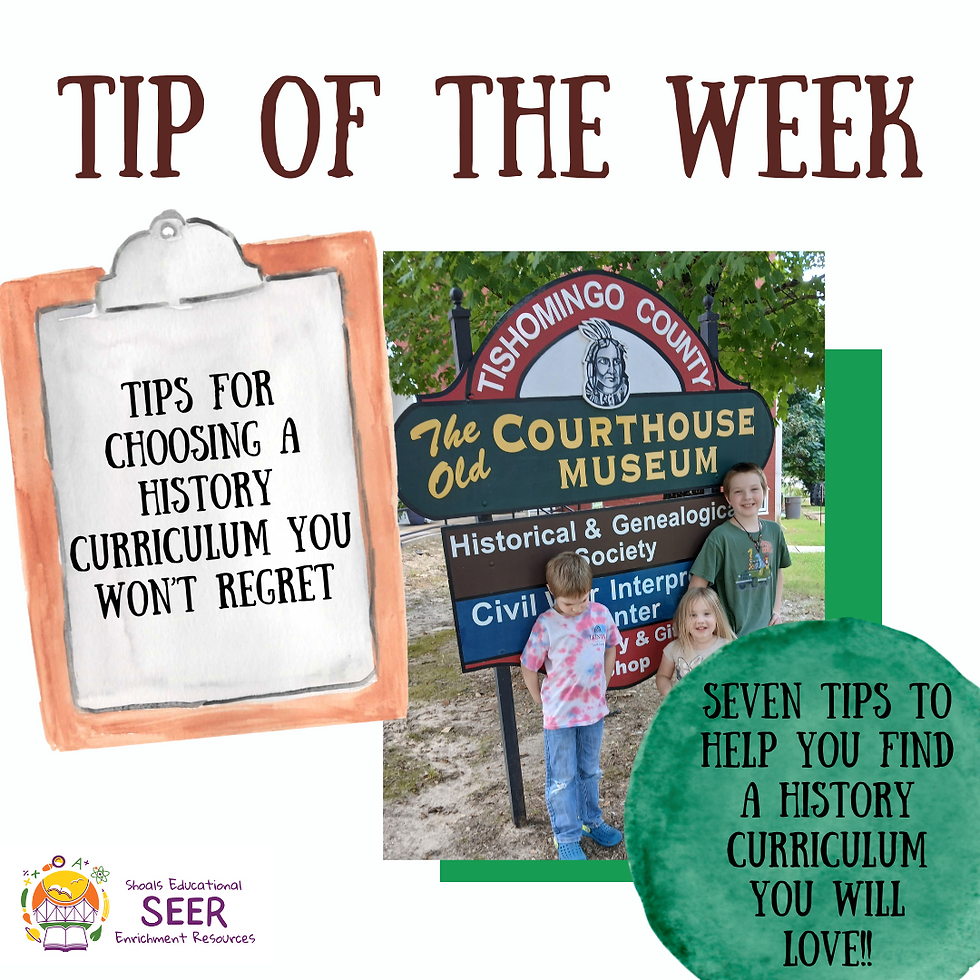Ten common questions I get from people in their first year of Homeschooling
- shoalseer
- Sep 9, 2025
- 4 min read

I've been in the homeschool world roughly forever at this point and truthfully the most common questions these days are really not that different from the questions people asked when I was a kid. A lot of homeschool knowledge can feel murky if you have never done it before or don't know anyone that has. If you are new to homeschooling, considering it, or have a friend who is interested here are the top 10 questions I am asked as a homeschool consultant/parent/graduate.
1. What homeschool do you use?
This is a super common question, especially in Alabama, where homeschooling is relatively unregulated. The truth is, there isn’t “a homeschool” you sign up for like a public school. Each family chooses their own path and curriculum. In some states there are different legal requirements, but here in Alabama, you choose what works for your family. It's often described as the wild west. That much freedom can be intimidating for some people and that is understandable. Doing your own research about what you want your homeschool to look like is crucial here.
2. How do you get started?
If your child is enrolled in public (virtual or in-person) school, you'll need to withdraw them first. Then, you’re free to:
Deschool (yes, it’s a thing)
Pick a curriculum
Build a schedule and rhythm that works for your family. Take your time. You don’t need to have it all figured out on Day One.
3. What about K12 or Connections Academy?
These are virtual public school options, not homeschooling in the legal or philosophical sense. They are government-funded, subject to state requirements, testing, and policies—just like brick-and-mortar schools. They can work for some families, but it’s important to understand they’re not the same as independent homeschooling.
4. Where can I find an accredited homeschool?
Short answer: you can’t. Accreditation applies to schools or institutions, not curriculum. And more importantly—it doesn't really matter. I was homeschooled without an “accredited” curriculum and went to college just fine. Many people do. Some companies use the word “accredited” as a marketing tool (and a money pit). Be especially mindful of religious programs like Acellus (Mormon roots) and Abeka (Baptist/Pensacola Christian College). Their materials also often whitewash history. So yes—do your research and know what you’re buying into.
5. Is it expensive to homeschool?
It can be—but it doesn’t have to break the bank. You’ll spend something: time, energy, money—or all three. But you don’t need hundreds per month to get started.
Look for used materials
Shop sales and curriculum swaps
Invest wisely (cheap often = cheap results). You’re building an education and a relationship with your child—it’s worth budgeting for.
6. Where are all the free curriculums?
In the public school system. I mean that with love: you get what you pay for. Homeschooling is an investment. Want free? Public school is already paid for through taxes. If you’re choosing something different, it should be a decision with some financial and personal buy-in. My mom homeschooled us on a tight budget in rural Mississippi—tutoring, teaching piano, and making it work. You can too. It’s about sacrifice, planning, and love.
7. Where do I find curriculum?
It’s everywhere now! Some great starting points:
Rainbow Resource Center
Local curriculum swaps & consignment sales
The Well-Trained Mind (excellent classical resources)
If you're local, check out The Shoals Educational Exchange Sale—my friend Jeannie and I host it twice a year!
8. Can my child go to college or get a diploma if they homeschool?
Yes! Absolutely. Homeschoolers go to college all the time. You’ll just need to:
Research graduation requirements for your state
Look up the admissions requirements for the colleges your child is interested in. You may issue your own diploma or go through an umbrella school if your state requires it. Either way—college is totally on the table.
9. But how will they be socialized?!
Ah, the classic. 😄First of all—we “socialize” dogs, not kids. Second, homeschoolers are often over-socialized if we say yes to everything:
Co-ops
Park days
Enrichment centers
Sports teams
Homeschool groups like SEER
Theater
There are tons of options. It’s honestly more about saying no than finding opportunities.
10. My child doesn’t want to do the work. How do I make them?
Welcome to parenting and teaching. 😅Establishing routine takes time. Here are a few things to consider:
Do they know what’s expected each day?
Are you schooling for too long? (Young kids can’t sit for hours—nor should they.)
Are you in a tough season? We all have them. Discipline, patience, and consistency matter—but so does flexibility. Some days are hard. Some kids resist. That doesn’t mean homeschooling isn’t working—it means you’re human. Keep showing up.
Homeschooling is hard, beautiful, intentional work. It’s not one-size-fits-all, and that’s the point. You can do this, but you’ll need to educate yourself first, be willing to grow, and make a few sacrifices along the way.
*Disclaimer - I am not a lawyer nor do I offer legal advice of any kind. Do your own research.
We’re raising the next generation—we don’t take that lightly. Homeschooling can be a beautiful and different sort of life. You get to decide if that is the journey you want to take. ❤️





Comments